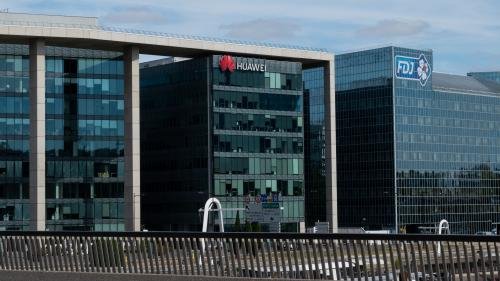A team meeting on Teams at 10 a.m., four “conf-calls” with clients in the afternoon, not to mention Skype with the family at 7 pm to celebrate the birthday of the youngest… With the health crisis, videoconferencing has become essential in our daily lives. Last spring, it even became essential to maintain the social link in our confined lives.
But since then, the Zoom aperitifs have given way to the phenomenon of “Zoom fatigue” *, a feeling of exhaustion in the face of the accumulation of these virtual meetings. Because oanother visual fatigue, linked to prolonged fixation of a screen, videoconferencing is above all a source of mental fatigue, explains to franceinfo Nawal Abboub, doctor in cognitive sciences. And for good reason: a video chat requires much more concentration than a face-to-face exchange. But how to explain it?
First, by the difficulty of relying on the body language of the interlocutors. When we are in the presence of someone, a nod of the head indicates, for example, that we are listening to them. Posture and gestures can translate our desire to speak. So many non-verbal signs, often unconscious, which “facilitate a clear understanding of messages and intentions during an interaction”, But less numerous in videoconference, analysis for franceinfo Marie Lacroix, doctor in neurosciences. It is indeed difficult to discern the gestures of a person in a video call if his camera is framed at shoulder level. “And then, to avoid parasitic noises, we tend to mute our microphone when we don’t have the floor, adds Marie Lacroix. So we get even fewer signals. “
The brain must therefore concentrate more to rely on other indicators, such as tone of voice or facial expressions. But even with an optimal internet connection, technology still renders this information with a slight delay, and makes it even more difficult for our brains. This is what Nawal Abboub calls “desynchrony”.
“It’s a lag that maybe calculated in milliseconds. But it’s enough to require extra effort for the brain to reconstruct reality.”
Nawal Abboub, doctor in cognitive science
to franceinfo
The reduction and poor quality of signals “obliges us[nt] to be more attentive to follow and ready[nt] at times of confusion in the conversation “, confirms Marie Lacroix. Videoconferencing thus disrupts the fluidity and rhythm of the exchange, underline the two specialists. You have certainly already encountered this situation: a silence suddenly settles in the video discussion, and in a few seconds causes a feeling of embarrassment among you and your colleagues, before two of them finally speak in same time.
“The distribution of speech in a group is regulated unconsciously, thanks to non-verbal signals. In video, it becomes very difficult to find a spontaneous rhythm.”
Marie Lacroix, doctor in neuroscience
to franceinfo
Above all, video calls deprive us of “synchronicity in the exchange of glances”, reports Marie Lacroix. To give the impression to the other party to look him in the eyes, you have to fix the camera, which de facto prevents observing his reaction at the same time on the screen. In videoconferencing, each participant therefore tends to keep their gaze on the screen, not looking directly at the others, but only their filmed rendering. However, during a discussion, visual contact with others stimulates the attentional system and reinforces memorization. So, when faced with a video where an individual is speaking, “our attention is drawn more when the person speaking gives the impression of looking at us about 30% of the time”, indicates Marie Lacroix, citing a study conducted by two British academics *.
Even more surprisingly, the absence of eye contact is interpreted by the brain as “eye avoidance “, notes the expert. This unconscious and automatic reaction gives “the impression that the person is on the defensive or inattentive”, she explains. Likewise, delays in sound and image cause a negative interpretation of the interlocutors. In 2014, German researchers showed that a lag of 1.2 seconds could be enough to be perceived as less friendly or less focused *.
If videoconferencing upsets the perception of others, it also changes the way you look at yourself. Seeing yourself onscreen while chatting with others plays on anxiety and mental fatigue. “When you are on a video conference you know everyone is watching you. You are like on stage which causes social pressure and the feeling that you have to act.”, highlighted Marissa Shuffler, Lecturer in Organizational Psychology at Clemson University in America, with the BBC *. In addition to having to manage the conversation, the mind keeps wondering what posture to adopt or focusing on its own face.
And in the current context, where professional and personal spaces become one, lhe brain is all the more on the lookout for the slightest situation that generates discomfort with our colleagues: what if one of the children burst into the camera view? Or that the cat was climbing on the desk?
“You are putting your brain in a double task: you focus on both the person you are talking to and yourself.”
Nawal Abboub
to franceinfo
“However, the attentional system does not process information in parallel, but in series”, adds the specialist. And each round trip between your face and that of your interlocutor consumes energy. “The attention you pay to your image also depends on the person in front of you, however specifies Nawal Abboub. When you chat with a colleague, collaborator or superior, you are not on the same levels of resources. ”
The situation is further complicated when there are many participants in the meeting. Gallery mode, where faces appear in small thumbnails, is difficult for the brain to manage. “It’s like we have to play ‘Where’s Charlie?'”, illustrates Marie Lacroix. “We can pick up fairly general things, see if the audience seems receptive or loses interest, but it’s more difficult to pay attention to each one”, she nuances. Not to mention that a video call is not just about a screen with one or more faces. “IThere is also a chat on the side and notifications may appear, details Nawal Abboub. There are many sources of distraction and it makes the space even more difficult to concentrate. “
Faced with this influx of information, the brain is therefore “continuous partial attention”, analysis National Geographic*, and juggles a multitude of tasks, without fully concentrating on one of them. As if you were trying to cook and read at the same time, notes the media.
In addition, with the health crisis, moments of life, usually separate, are now all brought together by videoconference. “Imagine going to a bar, and in that same bar, chatting with your teachers, meeting your parents, or having a date. That’s exactly what we’re doing right now. [en visioconférence]“, argues Gianpiero Petriglieri, professor at the European Institute of Business Administration, with the BBC.
“Remote work imposes on us a single channel which is the computer.”
Marie Lacroix
to franceinfo
“Mental fatigue is generated by the accumulation of time spent on the same task”, explains the expert. Even when juggling business meetings and video calls with friends, the activity remains similar and therefore causes burnout. All the more so if the participants are not very active during these videoconferences. “It may sound counterintuitive, but remain passive [face à un ordinateur] is even more demanding of energy “, adds Nawal Abboub, comparing this situation to work “very exhausting” video surveillance professionals who constantly scan screens.
So how do you protect yourself from this fatigue? Consider taking visual breaks first. “Every twenty minutes, you have to lift your eyes from your screen and look twenty meters in front of you for twenty seconds”, recommends Marie Lacroix, who co-founded Cog’X, a cognitive science consulting agency for businesses. Another possibility: to set shorter meeting times to allow time for recovery.
Exit also the systematic use of the camera. “On can turn it on at the start of the meeting, to hear from others, keep this moment of interactions, suggests Marie Lacroix. Then cut it off when you get into more technical aspects of the discussion so everyone can focus on the content. “
To compensate for the absence of some of the non-verbal signs, Nawal Abboub, co-founder of the consulting agency Rising Up, suggests “play more on the voice “ or“amplify facial gestures” to capture the attention of the audience. Establishing explicit rules also makes it possible to facilitate exchanges: raise your hand to speak, ask questions in the chat space.
“We must not fall into the syndrome of visionitis either “, Continues Nawal Abboub, who encourages people to alternate with other modes of communication. “We can also call each other by phone, send each other messages, work on shared documents”, she explains. According to the expert, the best advice to adapt is to learn to “know the way our brain works “. “It’s not a computer that can run Powerpoint and Excel at the same time”, smiles the scientist.
* Links marked with an asterisk refer to articles in English.















